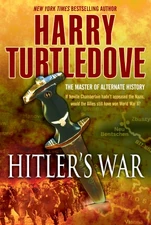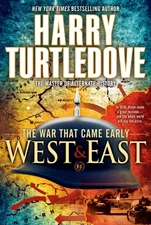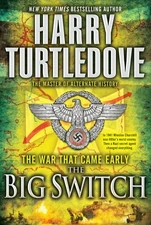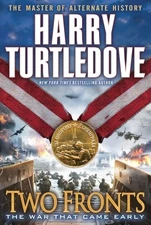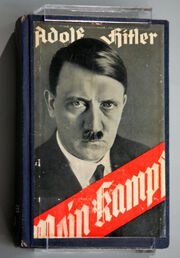
Original Cover
Mein Kampf (English translation: My Struggle or My Fight) is the signature work of Adolf Hitler, the leader of Germany before and during World War II. It combines elements of autobiography with an exposition of Hitler's political ideology of Nazism. Volume 1 of Mein Kampf was published in 1925, with volume 2 in 1926.
In Mein Kampf, Hitler makes a biographical account of his life and also describes plans for German-allied countries to rule Europe, along a racist worldview of white supremacy with "Aryans" as the "master race" at the top and Jews at the bottom: Germany would re-arm and join the United Kingdom and Italy as allies to defeat France and Eastern Europe, eventually overthrowing the Soviet Union to conquer the so-called "twin evils" of Communism and Judaism, giving Germany Lebensraum ("living-space") to the east.
Mein Kampf in In the Presence of Mine Enemies[]
Mein Kampf was in many ways the spine of Germany's global empire, as the country emerged victorious from both the Second and the Third World Wars, establishing the largest land empire the world had ever seen. However, Mein Kampf also weakened the totalitarian state which the Reich had become.
In the First Edition of the work, Adolf Hitler had written of the virtues of the Nazi Party electing its leaders democratically. As time went on and Germany achieved its empire, Hitler and the Nazi leadership adopted the notion of Führerprinzip and quietly removed notions of democracy from the subsequent editions of Mein Kampf. By 2010, most of those references had been forgotten.
However, when Führer Kurt Haldweim died, various entities in Germany's empire saw an opportunity to push for greater autonomy, harkening back to the First Edition. Leading the way was the British Union of Fascists, which elected Charlie Lynton as their leader, and by default Prime Minister of Great Britain, by popular vote.
In Germany proper, the newly appointed Führer, Heinz Buckliger, also referenced the First Edition to slowly institute reforms in the Reich, and announced elections for July, 2011. When the SS launched a Putsch to oust Buckliger, the German people rose up to stop it. Buckliger prevailed, and reforms began in earnest in Germany and its territories.
Mein Kampf in The War That Came Early[]
Mein Kampf was a household staple inside Germany when Czechoslovakia was invaded by Germany in 1938. Samuel Goldman had read the book, and realized that Adolf Hitler's anti-Semitic views were nothing more than plagiarism of historical urban legends. However, he kept those views to himself, as he seriously doubted that any German would believe a Jew.
Mein Kampf in "Zigeuner"[]
Adolf Hitler's book, a very hefty volume, described the true enemies of the Reich in great detail. Joseph Stieglitz had read the entire book two or three times, and especially took its passages about the Zigeuner to heart.
Literary comment[]
The title of this "Hitler's book" is not given. It is included here for convenience.
See also[]
- Over Open Sights, a fictitious book in the Southern Victory universe with many similarities to Mein Kampf.
| ||||||||||||||||
| ||||||||||||||||||||||
| |||||

